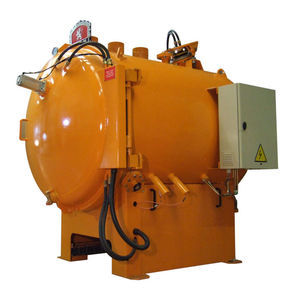
- Production - Materials - Metrology
- Surface treatment
- Chamber furnace
- B.M.I. FOURS INDUSTRIELS

- Products
- Catalogs
- News & Trends
- Exhibitions
Carburizing furnace ALLCARB®chamberfor aeronauticsannealing
Add to favorites
Compare this product
Characteristics
- Heat source
- carburizing
- Configuration
- chamber
- Other characteristics
- for aeronautics, annealing, low-pressure
- Temperature range
Max.: 1,500 °C
(2,732 °F)Min.: 1,050 °C
(1,922 °F)
Description
Carburizing or carburation is a thermochemical treatment aimed at hardening steels by adding carbon and increasing surface hardness.
Carburizing is a thermochemical treatment aimed at hardening steels by adding carbon and increasing surface hardness. Low-pressure carburizing nowadays is an efficient alternative to conventional carburizsing / carburation techniques, notably bringing about noticeable improvements in homogeneity, penetration and a total absence of intergranular oxidation.
BMI optionally offers the ALLCARB® process for its entire range of high-temperature furnaces (vacuum annealing, vacuum gas quenching and vacuum oil quenching). This technique has been in operation since 1990 in sectors such as aeronautics and the automotive industry. The technique, the use of gas, carburizing and the systems are the subject of numerous patents.
The ALLCARB® technique is distinguished by its industrial results: precise, reproducible and homogeneous. Its use is facilitated by a software assistant, which helps to calculate the cycle parameters according to the depth sought and the steel grade. However, the user retains the possibility of modifying them in order to optimise them for his specific application.
Different from the current low-pressure carburizing techniques, ALLCARB® perfectly meets industrial constraints:
Large / dense load treatments
Deep penetration in cylinder bores
Reduced tolerance of carburised depth
Better control of surface carbon
The carburizing gases generally used at low-pressure were replaced by a gas that ensured perfect reproducibility with neither the inconveniences of propane, which does not penetrate thoroughly and forms soot,
*Prices are pre-tax. They exclude delivery charges and customs duties and do not include additional charges for installation or activation options. Prices are indicative only and may vary by country, with changes to the cost of raw materials and exchange rates.



